Venice 2023 round-up: Key talking points of this year's 80th edition

The 80th edition of the Venice Film Festival was one of the most eclectic in recent years and more than delivered the goods in terms of cinematic goodness.
It awarded Yorgos Lanthimos' Poor Things the top award and the Golden Lion should secure the film as a frontrunner for this year's upcoming awards season.
Here are the key takeaways from the festival, considered the launchpad for Oscar glory.
No stars? No problem

The ongoing actors and writers strikes were one of the main talking points on the Lido this year, strikes which threatened to sink the 80th edition, with noticeably less A-listers on the red carpet.
A few did manage to show up – Adam Driver, Patrick Dempsey, Jessica Chastain, Peter Sarsgaard – thanks to secured interim agreements with the actor’s union SAG-AFTRA, but the Hollywood absence was felt. A-listers like Bradley Cooper (Maestro), Emma Stone (Poor Things) and Michael Fassbender (The Killer) were missed, and even if directors like Ava DuVernay, David Fincher and Woody Allen did show up, this 80th edition was a far cry from the glitzy editions we’re used to.
The Competition jury, led by Damien Chazelle (La La Land, Babylon), donned strike supporting T-shirts, and those who came overwhelmingly stated their support for the Hollywood strikes.
But all in all, the feared impact of the strikes on the festival was greatly exaggerated. Many of the movies more than made up for a less lively party scene and fewer viral red carpet moments.
Prior to the festival, Venice artistic director Alberto Barbera insisted the strikes had barely affected his selection - with the biggest impact being the loss of Luca Guadagnino’s festival opener Challengers. It seems he was right, as Venice has maintained its reputation as the unofficial starting gun on awards season. More on this later.
Trends: Biopics, hitmen and lustful yearnings

It was a big year for biopics in Venice, with Edoardo de Angelis’s Comandante, Michael Mann’s Ferrari, Bradley Cooper’s Leonard Bernstein drama Maestro, Pablo Larraín’s eccentric reimagining of Chilean dictator Augusto Pinochet’s life as a vampire with El Conde, Sofia Coppola’s portrait of Priscilla Presley with Priscilla, and Quentin Dupieux’s madcap short Daaaaaali!
Their inclusion in the line-up was to be expected, as the ubiquitous genre is awards catnip. While it often strays towards the sanitized, all selected this year on the Lido performed admirably when it comes to offering up something different. They didn’t feel like biopics.
Granted, opening film Comandante - which chronicled the maritime heroics of Italian WWII submarine commander Salvatore Todaro (Pierfrancesco Favino) - was a tad heavy-handed but still managed to pass as a noble ode to human solidarity.
Better but not-quite-there was Ferrari, a disappointingly by-the-numbers affair from Mann, that still managed to sustain interest by making the film more an operatic relationship drama rather than a cars-go-vroom thriller. (Read our full review)
Both of these films paled compared to Bradley Cooper’s Maestro, a love story that also focused on marital troubles and was equally about Bernstein and his wife, played to perfection by Carey Mulligan. (Read our full review) Cooper’s sophomore effort behind the camera was without a doubt the biopic highpoint of the festival, followed closely by Priscilla. Sofia Coppola’s film ended up being the furthest thing from an estate-approved box-ticking exercise, showing the rather dull life of two souls trapped in prisons both thrust upon them and of their own making.
As for the generally maligned but compellingly eccentric El Conde, it was a black-and-white panto that bordered on farce rather than a biopic. (Read our full review) Same goes for Daaaaaali!, the prolific French surrealist Quentin Dupieux’s valentine to Salvador Dalí, whose form fittingly mirrored the content. Both underplay (El Conde) and overplay (Daaaaaali!) their hands, but commendably managed to breathe life into a familiar genre.
Whichever you vibe with the most, there was something refreshing about the lack of hagiography, and none felt as toothless as the likes of Bohemian Rhapsody, Respect, Green Book and their awards-bothering ilk.
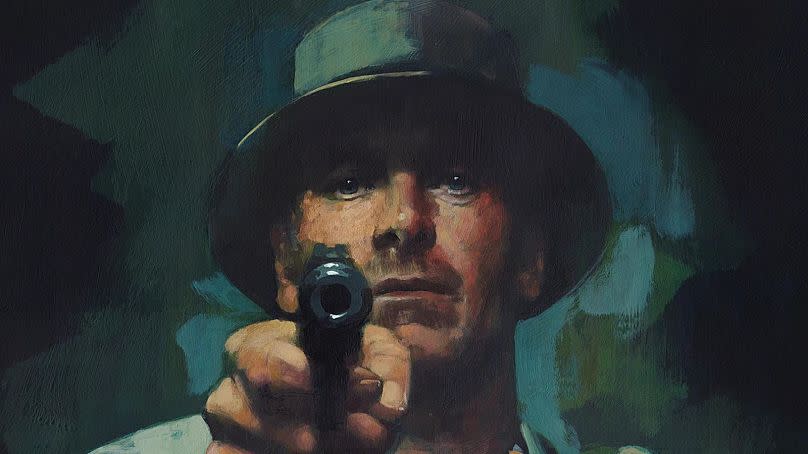
Biopics aside, assassins were all the rage this year.
This year had three separate films about guns for hire, and two impressed.
David Fincher’s The Killer starred Michael Fassbender as contract killer who wears German tourist bucket hats, listens to a lunatic amount of The Smiths, and has a seemingly endless monologue going on inside his head. The nihilistic thriller hit its mark (even if the titular assassin didn’t at first) and while it isn’t up there with the likes of Zodiac and Se7en, it’s a moody and unparalleled when it comes to Fincher’s surgical sense of style. (Read our full review)
In a much different vein was the Richard Linklater’s “somewhat true story” Hit Man, a comedy of errors about a philosophy professor who moonlights as a fake hitman for the New Orleans Police Department. Top Gun: Maverick heartthrob Glen Powell impresses in a versatile role no one expected him to ace quite so hard; the whole thing plays out like a fun and quality return of the goofy American comedies that have been lacking over the years.

And then there’s Harmony Korine’s AGGRO DR1FT. The kindest descriptive for this one is that it’s uncompromisingly experimental, and that’s always something to celebrate. The fairest assessment, however, is that it’s an interminably long 80 minutes of nothing, an empty provocation that had people leaving the screenings en masse.
Shot in infrared camera and peppered with AI effects, the film is the Spring Breakers director’s first under his new company EDGLRD (a name which should tell you plenty). It’s about a seasoned Floridian hitman (Jordi Mollà) who repeats that he is the “world’s greatest assassin”. Both an homage and a send up of video games – and featuring some classic dialogue like “Dance bitches, dance bitches, oh yeah, dance bitches” - the director described it thusly: “Life is good. Without it we’d be dead. AGGRO DR1FT. In between worlds. Locked and loaded. An ode to the aggressive drifter.”
Life was far from good after this one and many eyes were screaming bloody murder.
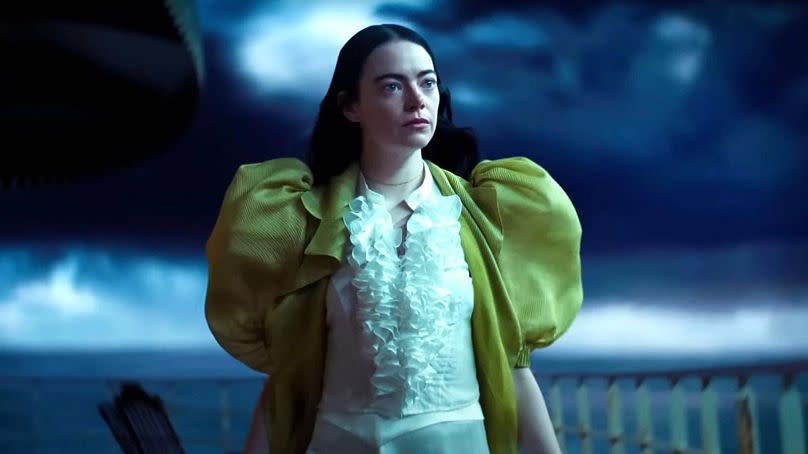
Far more appreciated were two other trends this year on the Lido: the fact that many films were graced with crisp monochrome (Maestro, The Theory of Everything, Green Border, El Conde), making films look stunning with black-and-white cinematography; and sex.
More accurately, the declinations of lust.
Golden Lion winner Poor Things led the charge, with Emma Stone playing a young woman brought back to life after a mysterious suicide attempt. Stone gives a wild and audacious performance as a blank slate unmoored by social niceties or the prejudices of her times. From discovering masturbation, grabbing the housekeeper’s “hairy business”, her erotic escapades with a rakish solicitor who can’t keep up with her “furious jumping”, the character of Bella is a “changeable feast” who refuses to conform through her evolving and growing agency. She symbolizes (and ultimately upends) all the typical tropes that female protagonists are traditionally assigned, moving from ingenue to whore to enlightened being, as well as – by design – both mother and daughter. She’s the beating heart of Yorgos Lanthimos’ layered, outrageous and mordantly funny “diabolical fuckfest of a puzzle”, and what a joy to witness a heroine who is celebrated for her unabashedly sexual yearnings rather than judged. (Read our full review)
Unlike Poor Things, there’s a more tragic dimension to the sexual desire in Priscilla, with Priscilla Presley’s marriage to Elvis characterised by its initial chastity.
Cailee Spaeny plays the titular role to perfection (and won the Volpi Cup for Best Actress for her efforts), and her frustration at the lack of sex in their marriage only buttresses the fact that Elvis used the fact that she wasn’t legally of age to turn her into a virginal totem of purity to better feed his Messiah complex. Again, Coppola’s approach highlights that biopics can explore complex dynamics and need not be reduced to saintly portrayals of iconic cultural figures. The film was stronger for it.
Controversy around Allen, Polanski and Besson
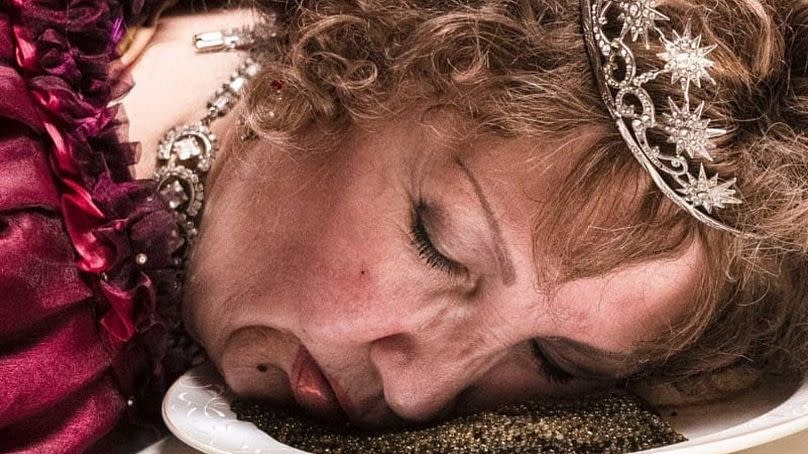
If the Hollywood strikes did deprive this year’s festival of some movie star charm and glamour, there was definitely debate. Specifically around three problematic directors.
The inclusion of films by Roman Polanski (The Palace), Woody Allen (Coup De Chance) and Luc Besson (Dogman) was always going to be a major talking point – specifically whether the decision to include three directors whose careers have been marked – if not swamped - in legal controversy was the right call, and whether some critics would shun the films altogether.
All filmmakers have been accused of predatory sexual behaviour in the past – with the allegations against Allen and Besson never substantiated, and Polanski, after pleading guilty in 1977 to unlawful sex with a 13-year-old girl, denying an accusation of rape made in 2019.
In the end, the controversy fizzled out. Besson’s Competition film was critically mauled but there was plenty of applause during the press screenings and premiere; Polanski delivered the worst film of his career and was a predictable no-show because of Italy’s extradition treaty with the US; and Allen’s Parisian farce got warm reviews and a rapturous reception at the premiere.
Granted, a topless protest did occur during the premiere of Coup de Chance, but the shouts of “rape culture” barely disrupted it. The French film collective Tapis Rouge, Colere Noire placed messages around Venice criticising the inclusion of the three men at the festival, and that was that.
This year reminded everyone quite to what extent the #MeToo movement never gained much momentum in Italy compared to the US.
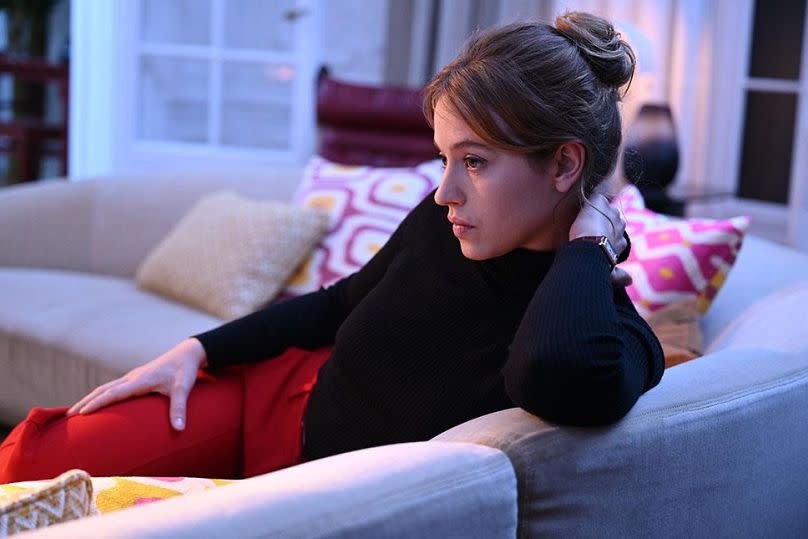
As for the films themselves, it was a mixed bag – to say the least.
Allen’s Coup De Chance, his 50th feature and first film entirely in French, emerged as the most watchable. It’s by no means up there with some of the 87-year-old's best films, but it’s comfortably the best thing he’s done since Blue Jasmine. That’s not saying much, but the work of Lou de Laâge and an eleventh-hour twist ending elevated a rather lazy script and made it the clumsier cousin to Match Point. (Read our full review)
Besson’s Dogman was initially promising but never lived up to its trashy potential, choosing instead to ape Joker a bit too much. Still, Caleb Landry Jones and the canines gave a good show. (Read our full review)
The worst by a country mile was Polanski’s alleged comedy, The Palace. It’s hard to fully comprehend how the director behind Rosamary’s Baby, Chinatown, The Pianist and even An Officer and a Spy – which premiered in Venice in 2019 – could curl out such a turgid Eurotrash dud with not a single redeeming quality to be found.
Alberto Barbera spoke out defending the _Triangle of Sadness_- aping movie and criticizing reviewers for treating Polanski with a lack of “respect.” He did admit that he told Polanski the film was “not completely resolved” - which is a better punchline than any in The Palace.
Read our disrespectful review here.
Looking back at the festival, it’s a shame that the initial inclusion controversy was not matched by superior movies. Instead of fuelling a debate about the separation of the art and the artist, the inclusion of such middling, bland or outright awful films just felt like a rather shameless opportunity to blast “cancel culture” and coast on the names of once-great filmmakers.
Poland under fire
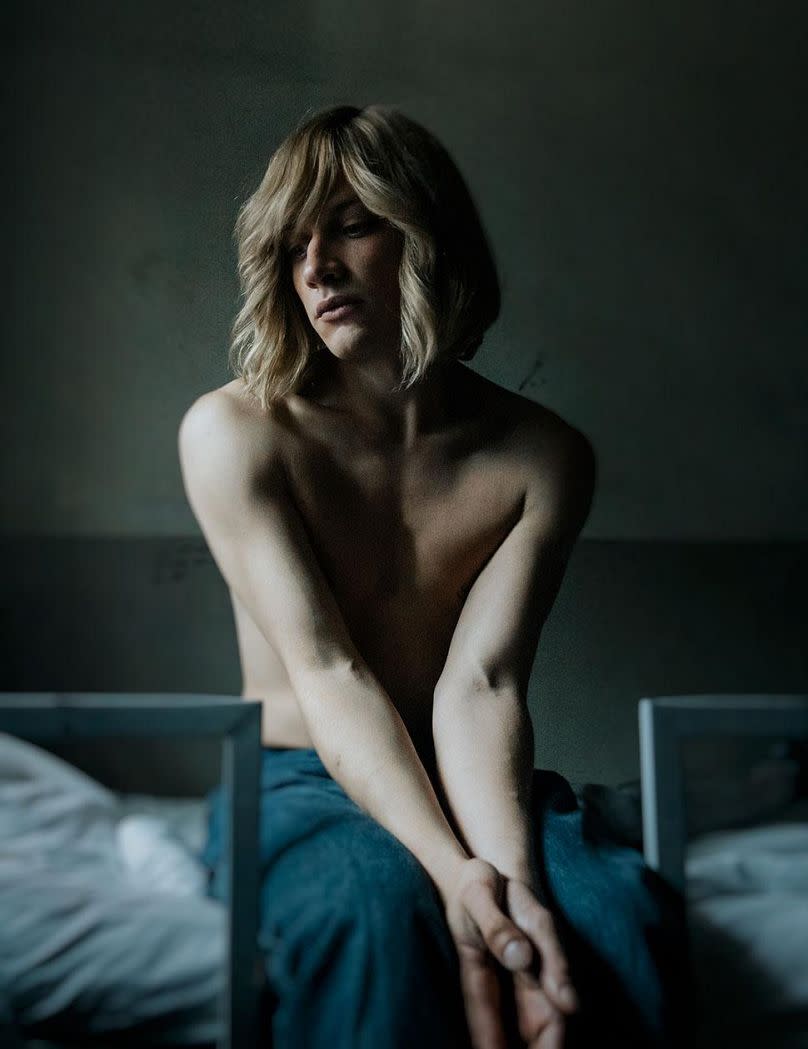
It wasn’t just Polanski who was taking the flack for Poland this year, as the country was under fire throughout this 80th edition. And for good reason.
Polish directing and writing duo Malgorzata Szumowska and Michał Englert offered Kobieta Z... (Woman of...), a solid trans drama that is a flawed portrait of transitioning and a more eloquent snapshot of post-communist Poland. Set against the landscape of the Polish transformation from communism to capitalism, Kobieta Z... spans 45 years of the life of Aniela Wesoły and her journey to find personal liberty as a trans woman. Aniela lived almost a half of her life lived as a man in a provincial town and the film shows her laborious journey to freedom, faced with family life and complicated attitudes in her environment.
Szumowska and Englert said that the film was the result of “countless meetings with transgender people - people of all ages who have lived in Poland for decades, who have graciously trusted us to share their stories.”
The film is dedicated to the LGBTQ community and takes aim at modern Polish society, specifically the absence of laws on gender identity and the lack of acceptance with regards same-sex marriage. Through the story of Aniela, we see how the Polish government has consistently deprived the LGBTQ people of their right to fully participate in social life. It is an important film in this respect, as the barriers faced by the lead character reflects the modern and alarming figures linked to suicide rates among Polish LGBTQ youth.
“We hope that our film will help people understand what it means to be trans and increase support for amendments in the law which will guarantee a life without threat. Our film does not judge any of the attitudes presented. The most significant element is the humanistic tone within the poignant story of our main characters, respectfully followed by our camera.”

Far stronger was Zielona Granica (Green Border), by veteran Polish director Agnieszka Holland.
Set on the frontier between Belarus and Poland, Holland depicts how refugees from the Middle East and Africa desperately try to reach the European Union and find themselves trapped in an absurd to-and-fro overseen by both the Belarusian and Polish governments.
The film is based on meticulous research, including interviews with refugees, border guards and activists, and the dehumanizing treatment from the indoctrinated guards is shown with gruelling precision, to better expose the sins of those who weaponize the persecuted to antagonise the EU. And Holland does not go lightly when it comes to calling out Poland’s inhumane policies, asking vital questions about collective responsibility and inaction in a geopolitical landscape Europe – as a collective – finds itself in. In its short epilogue, the filmmaker depicts how, in the wake of the war in Ukraine, the very same border welcomes thousands of Ukrainian refugees. Same pain, same loss, same devastation – different skin colour. It leaves you incapable of ignoring the sin of hypocrisy.
Green Border is emotionally devastating indictment of a continuing crisis and was a frontrunner for the Golden Lion this year. It went home with the Special Jury Prize, and could very well be 2023’s most vital viewing experience. (Read our full review)
The film is already courting some controversy in Poland, as Justice Minister Zbigniew Ziobro has labelled Green Border as “Third Reich propaganda.”
“In the Third Reich, the Germans produced propaganda films showing Poles as bandits and murderers. Today, they have Agnieszka Holland for that," wrote Ziobro on X (formerly Twitter).
Holland noted that Ziobro, who serves as prosecutor general as well as justice minster, commented on her film without having seen it and that she believed his words amounted to defamation, calling them “despicable.” She has demanded an apology from Ziobro and stated she plans to bring defamation charges against him. She also demanded that he make a charitable donation of 50,000 Polish zlotys (approx. €10,800) to an association that helps Holocaust survivors.
Watch this space.
The journey to awards season and this year’s must-sees
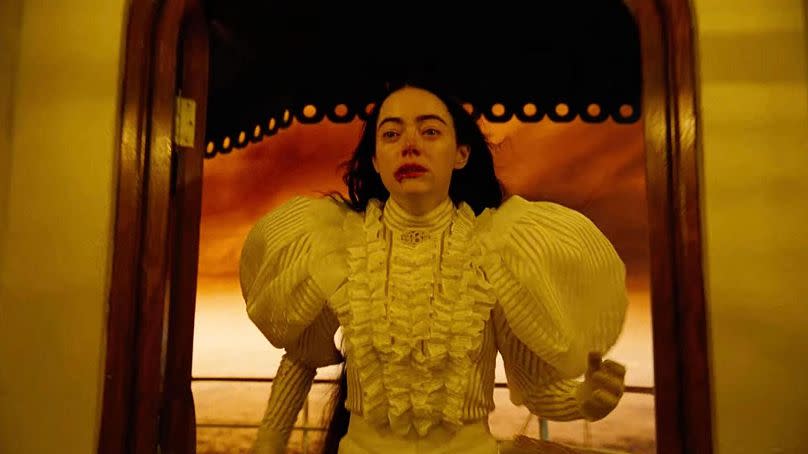
Star power on no on the red carpet, the Venice Film Festival once again managed to solidify its status as the unofficial start to awards season - the awards season launch pad, if you will.
By crowning Yorgos Lanthimos’ Poor Things , the film has cemented its place as an awards favourite. You can expect nods for Best Film, Best Director and Best Actress (Emma Stone for her note-perfect and evolving Bella Baxter). The only thing that may play against the film in the US is a possible higher adult rating, considering its surprisingly explicit sex scenes and full-frontal nudity.
Both Jessica Chastain and Peter Sarsgaard (winner of the Volpi Cup for Best Actor) are also solid contenders for acting awards. They star in Michael Franco’s Memory, a stomach-knotting affair that’s also surprisingly tender from the filmmaker who has shown a clear knack for sudden bursts of on screen violence (New Order, Sundown). The way the film deals the topics of sexual abuse, dementia, denial, and Festen -level family dynamics is well judged, and it made for an incredibly memorable addition to this year’s Competition.
Maestro is likely to be pushed in multiple categories by Netflix, specifically in the acting categories with Bradley Cooper and Carey Mulligan seeming like safe bets for the Oscars next year. Cooper could also pick up several directing nominations for his stellar work.
Elsewhere, Ferrari could be in with a shot, as could Pricilla’s Cailee Spaeny and Origin ’s Aunjanue Ellis for Best Actress. (Read our full review)

Here are our favourites of the 80th edition:
Poor Things (Yorgos Lanthimos)
The best film of the festival was given its highest award. This layered, witty, vividly constructed and above all fun adaptation of Alisdair Gray’s eponymous novel deals with the patriarchy, societal pressures, sexual freedom, and asks the question: Can people be improved? It will hopefully head to further awards glory in the coming months.
Zielona Granica (Green Border) (Agnieszka Holland)
An emotionally devastating indictment of a continuing EU crisis - and one of Agnieszka Holland's best films. Winner of the Special Jury Prize, it will be a favourite for Best International Feature at next year's Oscars.
Aku Wa Sonzai Shinai (Evil Does Not Exist) (Ryûsuke Hamaguchi)
Winner of the runner-up prize, Aku Wa Sonzai Shinai (Evil Does Not Exist) by Japansese filmmaker Ryûsuke Hamaguchi is an enigmatic and allusive eco-parable that plays out as a gently haunting tone poem. A tougher sell compared to his Oscar-winning Drive My Car, but without a doubt one of this year’s most mesmerizing films.
Menus Plaisirs – Les Troisgros (Frederick Wiseman)
Veteran documentarian Frederick Wiseman returned to the Lido with a four-hour doc chronicling of the routine at a three-Michelin-star restaurant. Maybe not as impactful or emotional as Ex Libris, but still stunning stuff from a true master of the form.
Maestro (Bradley Cooper)
For only his second film (after the Venice premiering A Star Is Born), Cooper dodged the typical cradle-to-grave biopic formula by focusing on a decade spanning love story between the sexually fluid composer Leonard Bernstein and Chilean actress Felicia Montealegre (the excellent Carey Mulligan). The film exudes a Golden Age of Hollywood mood that is entrancing.
Memory (Michel Franco)
Jessica Chastain plays Sylvia, a social worker and recovering alcoholic whose surprise encounter with a high school figure (Peter Sarsgaard) profoundly impacts her structured life, as well as reopen some doors from the past. Impactful and deeply moving, this could be an under-the-radar contender come awards season.
The Killer (David Fincher)
David Fincher teams up with Michael Fassbender, Se7en scribe Andrew Dean Walker and his Mank cinematographer Erik Messerschmidt, for a moody, slick and precise thriller that plays out like a more verbose riff on Jean-Pierre Melville’s 1967 crime classic Le Samourai. What’s not to love?
Bastarden (The Promised Land) (Nikolaj Arcel)
Mads Mikkelsen plays an impoverished 18th century captain on a mission to conquer the harsh heath in Nikolaj Arcel’s excellent period piece that aces everything it sets out to achieve. The film proves once again that if you want a leading man to elevate the already strong material (here, Ida Jessen’s 'Kaptajnen og Ann Barbara' ) to greatness, Mikkelsen's your Dane.
Gasoline Rainbow (Bill and Turner Ross)
After the stunning Bloody Nose, Empty Pockets, Bill and Turner Ross continue to blur the line between scripted fiction and documentary filmmaking in an ‘On The Road’ style road movie that genuinely captures a moment and a youthful energy.
The Caine Mutiny Court-Marshal (William Friedkin)
For his final film, French Connection and Exorcist director William Friedkin delivered a bare-bones courtroom drama based on events in Herman Wouk’s WWII novel. Completed just before his death last month and dedicated to the memory of its co-star, Lance Reddick, this simple but crescendoing drama features standout performances from Jason Clarke, Kiefer Sutherland and the much-missed Reddick.
Priscilla (Sofia Coppola)
A beautifully rendered fable that doubles as a cautionary tale, Priscilla manages to eschew some familiar biopic trappings. Cailee Spaeny was crowned Best Actress for her affecting portrayal of Elvis Presley’s neglected young wife, and there’s every chance she’ll be in the conversation for more awards.
La Bête (The Beast) (Bertrand Bonello)
This genre-bending tale from French conceptualist Bertrand Bonello stars Léa Seydoux and George MacKay as two people who keep connecting over the centuries. Based on a Henry James story, this formally daring sci-fi melodrama feels like a heady cross between Cloud Atlas and Eternal Sunshine of the Spotless Mind. It won’t be for everyone, but its musings on AI and the endurence of love strike a chord.
Click here for our full coverage of this year's Venice Film Festival.

 Yahoo News
Yahoo News 
